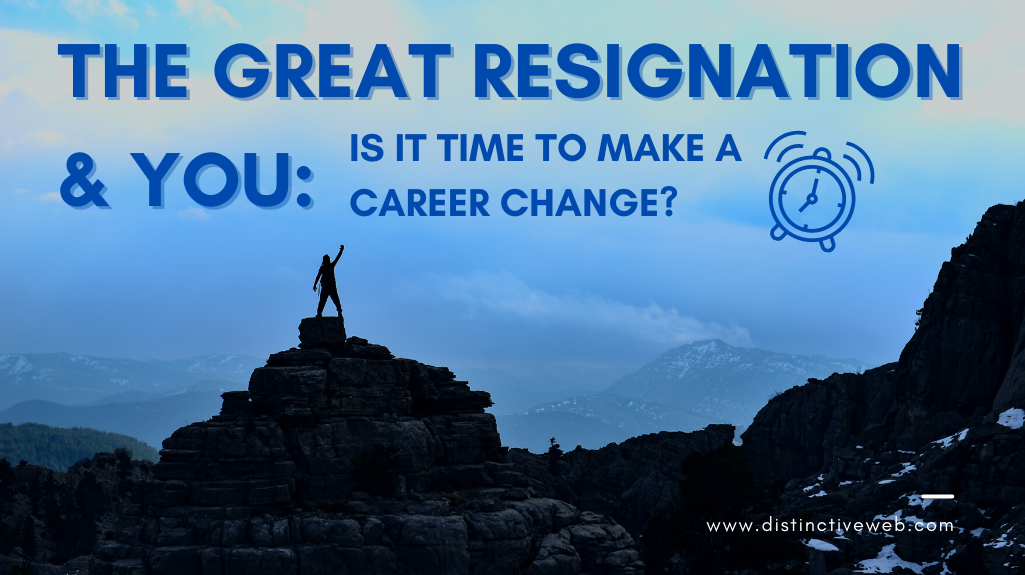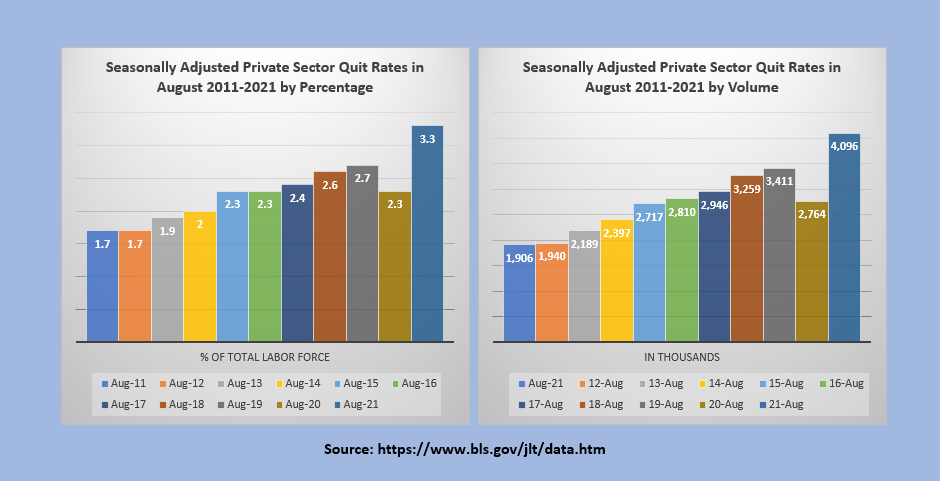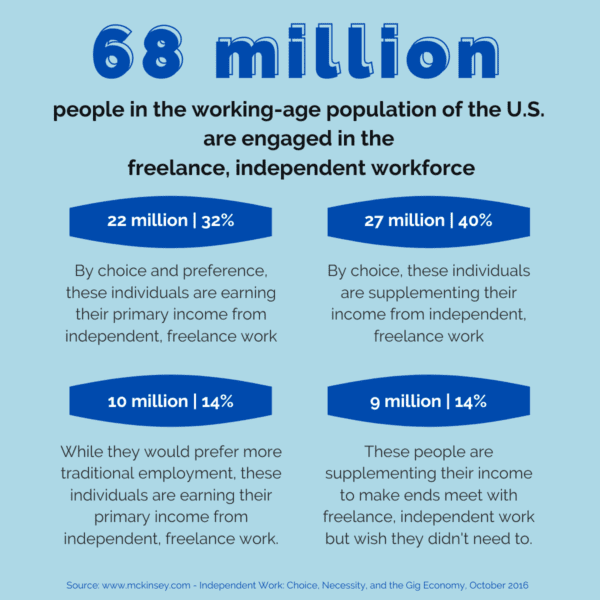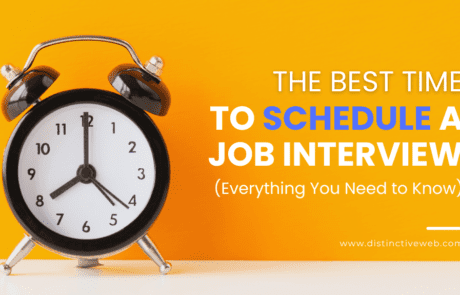
A staggering 4.3 million Americans (across all sectors) quit their jobs in August of 2021 – a figure that nears 20 million if measured back to April. The Great Resignation has taken many employers by surprise, many of whom are struggling to address the problem precisely because they don’t really understand why their employees are leaving in the first place.
Many of the resignations took place in customer-facing industries, such as the retail and hospitality sectors. So, you’d think employees were opting out of difficult low-wage jobs. But “Quits,” as the Bureau of Labor Statistics calls them, span a broad spectrum of the American workforce. No industry has been unaffected, and given the staffing shortages, companies have clearly taken notice.
Unsurprisingly, the turnover tsunami is no longer just an American phenomenon. A Microsoft survey found that 46% of workers globally were considering quitting or planning to make a career change. An overwhelming sense of ennui has taken hold of employees the world over, which goes to show that the pandemic has profoundly reshaped the world of work.
So, it’s not just you!
While the rate of people quitting their jobs has been steadily increasing for a number of years (with the exception of 2020, likely because of the pandemic), as of 2021, The Great Resignation is accelerating even faster. And lots more people are considering leaving their jobs, even when they don’t have another gig lined up.

The Why Behind The Great Resignation & Exodus
Two things are happening in the labor market right now.
- Economies and industries worldwide are rebounding in a big way, some even stronger than before the pandemic. As a result, there’s a dearth of skilled workers.
- Employers need to replace workers who’ve decided they needed a change and are fighting to retain those who haven’t left – yet.
Also, let’s not forget the psychological impact of the Covid-19 pandemic. Exhaustion has set in. The utter length of the pandemic coupled with the emergence of new variants and changing mandates have worn people out. Burnout has taken over the workplace. The motivation that led to increased productivity during those first months of the pandemic was fear-based.
The virus was new, and not much was known about it, and people felt lucky to have jobs as millions were retrenched. While fear can spur people into action, it’s also a stressor, and there’s only so much people can take. So, of course, the spike in employee engagement was short-lived. Many people have come to the harrowing realization that Covid-19 isn’t going anywhere and are learning to live with it.
These factors combined with the rise of hybrid and remote work means have shifted the tide. There’s a new paradigm in the job market, and employees are fully in power. In previous years, companies had the upper hand. An overabundance of skilled workers and limited vacancies meant they could demand a high threshold of requirements and not provide adequate compensation. Since many were grateful to have a job, they tolerated low wages and poor working environments.
People are finally done with sticking it out, and they’re being rewarded for it. Employers have reacted by raising salaries and increasing benefits. In 2021, wages for low-income workers have grown at the fastest rate since the Great Recession. But it’s still not enough. Many positions are going unfilled, and companies are feeling the brunt of it. What employers don’t understand is that people aren’t just looking for higher pay and more time off.
Beyond Work-Life Balance: This Isn’t Just A Fight About Remote Work
While the numbers backing up claims of The Great Resignation are shocking, they are lacking in context as to why people are really quitting.
On this note: Why are you thinking of your quitting your job? Perhaps, you’re questioning the whole meaning of the daily grind and grappling with whether you’re getting fair compensation for all effort and time you put in.
Let’s go through some of the reasons you’re contemplating jumping on The Great Resignation bandwagon to make a career change.
1. More Money
One of the best ways to increase your earning potential is to get a new job. People have always quit their jobs for more money and better perks. It’s a great reason to leave a job. Plus, a different work environment brings with it different challenges and opportunities for professional development.
Maybe, it’s time for a career change. A lot of people switching careers are moving into tech, and most are doing it for the money. Switching careers can be lucrative and fulfilling, but it does carry a financial cost since you’ll have to acquire new skills. But if you play your cards right, you’ll definitely recoup on the financial investment.
2. Better Work-Life Balance
Now, this is one aspect of The Great Resignation that employers do understand. In today’s fast-paced, hyperconnected world, it’s incredibly difficult to separate work from your personal life. Back in the day, before Covid-19 was a thing, many struggled to squeeze in rest and relaxation into their days.
Then Covid-19 hit, lockdowns and restrictions meant people had to sequester in place, which led to a historic shift to a work from home culture. Now, no one wants to go back to the office.
After all, going back to the office means commuting. And let’s face it, there’s nothing enjoyable about the commute to and from work. So, yes, work-life balance is a great reason to leave your current job. In addition to bumping up pay, many companies are now offering flexible working arrangements. You can set your hours and work where you want. As a white-collar worker, you now have more choice than ever before where you get to ply your trade.
3. Join the Gig Economy
Why wait for an employer to gift you the elusive work-life balance? Today, 20%-30% of the working-age population in the United States and the EU-15 work in the gig economy. These are the workers with a high degree of autonomy in how they structure their work and non-work time.
Working as a freelancer offers several advantages. One, you can work as much or as little as you want since you get to choose your workload. You have freedom of clients which means you can build a portfolio that could help you get back into the regular workforce – should you choose to do so at a later point in time.
Plus, you get to make more money and keep more of what you earn, as working from home will significantly reduce your expenses.

4. Do More Meaningful Work
People crave human aspects of work, which is the aspect employers tend to miss when it comes to the Great Attrition. If the coronavirus pandemic has taught people anything, it’s that life is short. Purpose and meaning do matter. Chances are you’re looking for a renewed and revised sense of purpose of work.
Yes, the pay, benefits, and perks are nice, but more than that, you want to find work that’s meaningful. A lot of people find meaning by joining the ranks of the self-employed. If you’re thinking of starting a business, consider the “Why” first. This way, you can turn your passion into profit while experiencing all the benefits of being your own boss.
Quitting A Job You Love? – Or Not
Whether you’re looking for flexibility, purpose, or higher pay, it’s a great time to make a career change. Really, it is! The war for talent is set to intensify. The job market has shifted in favor of workers, and there’s plenty of opportunities.
Still, it’s not a decision you should make impulsively. Carefully consider why you want to make a career change and what you want to do with your life. Figuring this out will help you make the right decision and design a career path that aligns with your life goals.









